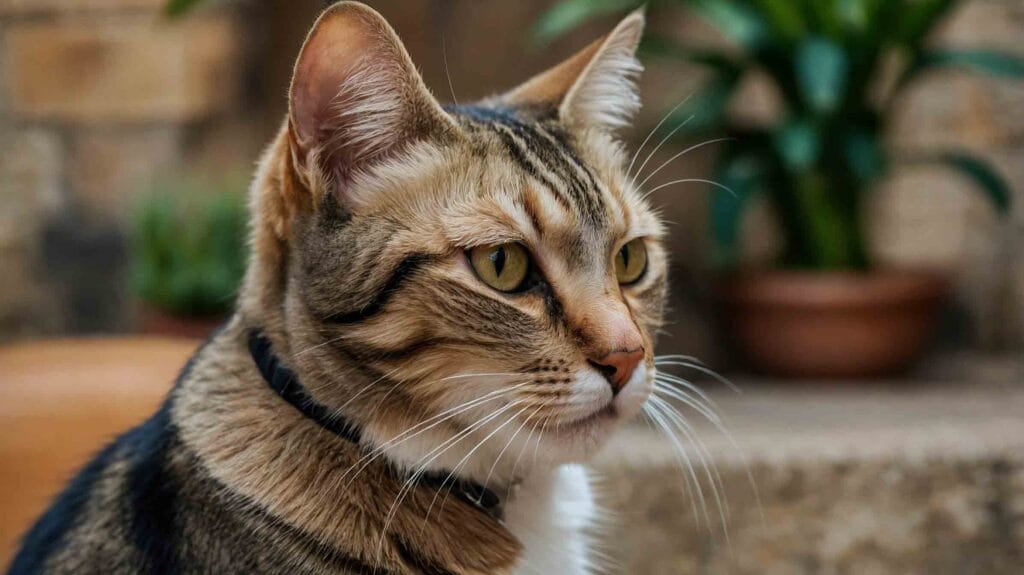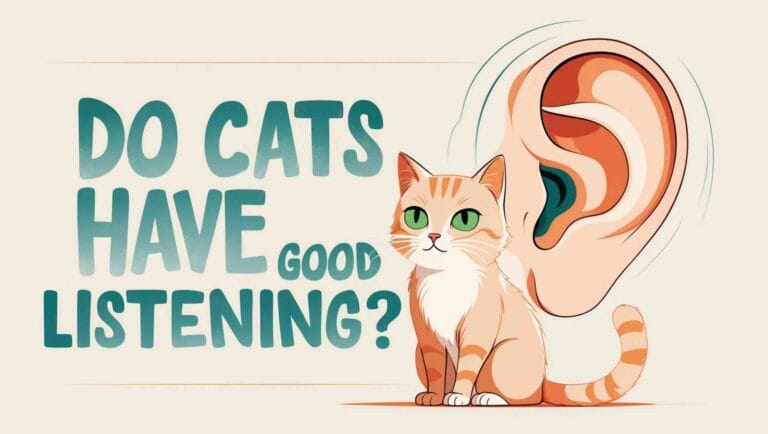Hello, cat buddies you know something? Do cats have good listening? Cats have always been revered for their mystery and grace, but behind those piercing eyes is another incredible characteristic.
They have the best hearing in the animal kingdom. We can look at their jumps or enjoy their comfortable purrs, but their perfect sounds are an equally amazing aspect of who they are.
Animals from meows to purrs and cats have developed a whole language through sounds, one that very few people know how to interpret because of how sensitive their ears are. Let’s Discuss Now!
The Anatomy of a Cat’s Ear
The ear of a cat is a wonder of biological engineering. The outer ear, or pinna, is the triangular, swivelling apparatus that catches sound waves.
A cat’s pinnae can rotate up to 180 degrees, unlike human ears, whose range of motion is limited, which helps them precisely triangulate the source of a sound without having to turn their bodies.
This skill is essential for hunting prey or feeling threatened.
The auditory system is even more complex inside the ear itself. Incoming sound waves travel through the ear canal to the eardrum, where vibrations are passed on to small bones inside the middle ear.
Those vibrations are then transformed into electrical signals in the inner ear’s cochlea, which sends them to the brain to be interpreted.
This fluid process allows cats to respond to sounds with lightning-fast accuracy, a talent that’s critical to their survival.
Coincidentally, the ear’s inner portion aids balance, hence cats’ ability to pounce and land back on their feet.
The vestibular system a structure tucked away in the ear operates as an internal gyroscope, allowing them to steady themselves even while lunging through the air with acrobatic skills.
How Cats Hear Compared to Humans
With regard to auditory range, cats put humans to shame. Whereas humans with normal hearing can perceive frequencies in the range of 20 Hz to 20,000 Hz, cats can hear sounds up to 65,000 Hz.

This enables them to hone in on high pitched sounds that are completely imperceptible to us, including rodents’ ultrasonic sound.
Cats can not only hear higher frequencies, but they are also extra sensitive to faint sounds. The faint rustle of grass or the quiet shuffle of a mouse will catch a cat’s ear thanks to its finely tuned hearing.
This increased sensitivity is an evolutionary adaptation that has allowed cats to succeed as stealth hunters.
Why Cats Have Such Sensitive Hearing
Cats don’t simply hear they are masters at deciphering the subtleties of sound. Their auditory cortex the region of the brain that specializes in processing sound is highly developed.
This enables them to distinguish between similar sounding noises, and even notice slight variations in tone or pitch.
On top of that, cats can pinpoint sound with remarkable precision. By comparing the time sound reaches each ear, they can locate a sound’s direction and distance.
That is a skill that is particularly useful in the wild, where a matter of survival can depend on responding to a threat or an opportunity in the blink of an eye.
Also read: How to Remove Cat Urine Odor from Carpet – cats idea
A Sound Cats Can Recognize
Perhaps one of the cutest things about cats is that they can hear their owners voice.
Studies have shown that cats can recognise their name among other words, even if they don’t respond.

Selective listening is a hallmark of feline independence they hear you, but they will determine whether whatever you are saying is worth their energy.
Aside from human voices, cats are also sensitive to many sounds around them.
All of those sounds register on their auditory radar the rustling of leaves, the hum of an approaching vehicle, the faraway chirp of a bird.
This heightened awareness helps them stay at tuned to threats and opportunities.
Also read : Will Coyotes Eat Cats? A Pet Owner’s Guide to Safety
Do cats listen to humans?
If you have ever called your cat’s name and received little but indifference in response, you may wonder whether they are listening at all.
Cats are actually great listeners, they just don’t always feel the need to do anything based on what they hear.
Unlike dogs, who will do anything to please you, cats are more selective in their reactions.
Cats are especially responsive to the sound of your voice. A soft tone can imply love, while a harsh one could indicate discontent.
But their response (or lack thereof) often hinges on their mood and priorities at the time.
Also read : Will cats kill chickens? Instant VETs Answer: cats idea
How Cats Use Their Hearing in Social Contexts
Hearing is one of the most important explanations in a cats world.
Cats vocalise in many different forms meows, purrs, hisses and growls, each designed to express something to another cat or to their human.
The sounds, which can be heard even from quite a distance, enable the cat to refine its behaviour in a social interaction with another cat.
And hearing is important for their interactions with humans, too.
A cat purring example it is not only a sign of a happy kitty but a form of communication used with their owner.
Attentive owners can get to know their pet’s needs and feelings by tuning in to the nuances of their cat’s vocalisations.
Also read : Is Blue Buffalo Good for Cats? – cats idea Best answer
The Role of Hearing in Hunting Behavior
For cats, however, hearing is a crucial hunting tool. They’re also able to hear high frequency sounds, giving them the ability to pinpoint prey that others might miss.
Once they’ve identified their target, their keen hearing allows them to locate its movements, even in pitch black.
(Hearings also enhances their other senses while hunting. Their sharp eyes and acute sense of smell are important, but it’s their ears that frequently give them the advantage.
Cats also employ auditory cues to accompany visual and olfactory data, allowing their hunts to be carried out with incredible accuracy.
Also read : Can Cats Eat Watermelon? – a vET sweet answer
Hearing Loss in Cats
Cats can also lose their hearing as they grow older just like we do. Other causes of hearing loss include ear infections, injuries and exposure to loud noises.
A cat that has gone deaf may not react to sounds, may vocalize more often, and may act differently.
With patience and adaptation, taking care of a cat with hearing impairment is very doable.
In such cases, using visual cues, a consistent routine and an environment free from hazards can help to ensure their health and safety despite their limited ability to hear.
Fun Facts About Cat Hearing
- While humans hear in an audible range of 20-20,000 HZ, and dogs hear in a range of 67,000-45,000 HZ, cats have the same super hearing capabilities of 68,000-40,000 HZ, so they can hear ultrasonic sounds, such as high frequency chatter of rodents, bats, etc. It grants them a distinct advantage to survive in the wild.
- A cat has more than 30 muscles in each ear, which tilt and rotate with incredible precision.
- Cat ears are also a mood meter beyond hearing. Flattened ears can indicate aggression or fear, while upright ears mean curiosity or alertness.
wrap up on Do Cats Have Good Listening?
A cat’s sense of hearing is truly amazing. From their capacity to perceive ultrasonic frequencies to their proficiency in sound localisation, the auditory faculties of bats attest to their evolutionary ingenuity.
Recognising and valuing this part of their inherent nature allows us to foster a closer bond with these engaging creatures and witness the unspoken orchestra of sounds they manoeuvre within the day to day.
So as your cat twitches its ears at a sound you can’t hear, consider this. their world is rich with a depth of auditory detail that we can only dream of. Good Night!
Also read : Can cats eat Bananas? The Surprising Truth!
FAQ: Do Cats Have Good Listening?
q1: How do cats hear humans?
Ans: Cats can hear people because their ears are very sensitive and can pick up a lot of sounds, even ones that humans can’t hear. They can spot sounds very accurately and can use their owner’s voice and tone to talk.
q2: do cats hear better than dogs?
Ans: Cats can hear more sounds than dogs can, so they can hear better. Cats can hear up to 64 kHz, while dogs can only hear 45 kHz. This makes them great hunters and watchers.
q3: how far can cats hear?
Ans: Cats can hear noise up to 64,000 Hz, which is much higher than what humans can hear. They can hear sounds up to four or five times farther away than people can, especially high-pitched sounds. They can find food even from long distances thanks to this sharp sense, which helps them stay alive.
q4: do cats have good eyesight?
Ans: The eyes of cats are very good, especially when it’s dark. Because they have a lot of rod cells and big eyes, they can see well at night. But compared to people, they have trouble telling the difference between small details and bright colours.
q5: do cats have sensitive hearing?
Ans: Cats hearing is much better than ours and is very sensitive. They are great hunters because they can hear high frequency sounds that humans can’t. They can also turn their ears in different directions, which helps them find sound sources more accurately. Keep their ears safe!
